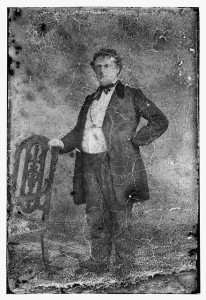150 years ago today most northern states celebrated Thanksgiving. From glancing through The New-York Times it seems that there was sadness for the absence of soldiers through death or away still serving in the one of the many “seats of war”. Nevertheless, there was plenty of food to go around. In an article entitled “THE DAY AMONG THE CHARITIES.; AN UNEXPECTEDLY PLEASANT TIME.” The Times noted, “The Home for the Friendless was unusually favored this year in the way of donations, both in money and provisions.” Like 1860 there were many sermons reproduced, including Henry Ward Beecher at Plymouth Church. And Thanksgiving was observed in the Union army camps. From The New-York TimesNovember 29, 1861:
NEWS FROM WASHINGTON.; Thanksgiving in the Camps A Quiet Day. …
WASHINGTON, Thursday, Nov. 28.
To-day has been unusually quiet. The Departments, stores and shops have been closed. Religious services were held in nearly all of the churches. Large numbers of visitors crossed the river to see their friends in camp. In the camps from the States the Governors of which had appointed this as the day of thanksgiving, it was generally observed. At the camp of the Second Wisconsin, a thanksgiving dinner was spread. Gov. RANDALL, Gen. KING and Col. MANSFIELD, of Wisconsin, and Senator WILSON were among the invited guests present. …
In 1861 each state decided if and when it would celebrate Thanksgiving. Governor Andrew proclaimed that Massachusetts would have its Thanksgiving on November 21. Here’s a bit about the celebration of regiments from Massachusetts. From The New-York Times November 28, 1861:
FROM GEN. STONE’S DIVISION.; Thanksgiving with the Troops– Great Doings in the Fifteenth and Nineteenth Massachusetts…
POOLESVILLE, Friday, Nov. 22, 1861.
There are few things in this world more enjoyable to a New-Englander than a Thanksgiving Dinner. The dinner itself is supposed to be good, but in its comfort-giving it is but the exponent of the thousand and one causes for gratitude with which the time past has been filled, and which, both in secret and in public, call for and receive from the hard-fisted sons of the East heartfelt and lip-spoken appreciation. A Thanksgiving Dinner should properly be eaten at home — elsewise it is bereft of many a pleasure and of many a desirable presence. But in times of war “some must fight while others pray,” and if those who are surrounding the camp-fire rather than that which blazes cheerfully on their hearthstone can be thankful, and can approximate to the delights of home, it is a most blessed circumstance. I don’t know how many troops New-England has in the field at this time, but if the doings and eatings, the sayings and drinkings of her hardy sons in this division may be taken as a sample of them all, it is fair to presume that for the next six months not a turkey, not a chicken, not a goose, or even a lame duck, will be seen south of Philadelphia or west of Baltimore. …
The correspondent was invited to the shindig that the Massachusetts 19th was putting on. This included a greased pole and a game of football!
Hearing that in addition to the dinner and ball, there was to be a greased pole and vigorous attempts on the part of avaricious privates to get a five-dollar gold piece on top of it, a grand game of football and a monster concert at sundown, I mounted my pet filly Nannie, and started for the camp. Arrived there, I found that Baltimore had unselfishly deputed some thirty of her fairest damsels, (among them a lovely descendant of the martyr ROGERS) who were scattered promiscuously about the camp, shooting at marks, throwing and failing to catch balls, and making wild with delight the several hundred privates who for months hadn’t seen a woman or a bonnet. It had been arranged that the two wings of the regiment — one under charge of Lieut.-Col. DEVEREAUX and the other under Major How — were to play a rousing game of football, the officers of the losing wing to pay for the wine yet to be drank at the Thanksgiving dinner. To describe so as to interest a non-professional reader a game of football, is an impossibility. Suffice it, then, to say that the poor ball wandered here and there, meeting with rebuffs on every hand and at every foot; that the right men pulled and blew, and kicked, and ran, and watched, and hurrahed, and screamed, and cheered, and oh’d and ah’d, while the left men pushed and yelled, and heeled and toed, and ran furiously here and there, attacking with apparent vigor the unoffending object of regimental persecution. After an hour’s sport, or rather an hour’s hard labor, one side gave in, and the other side — which was also on the point of giving in — saluted its leader with three rousing cheers, at the same time informing their opponents that if there was any other game which possibly they could play better, they would be pleased to be with them at a future occasion.
Then same the climbing of the greased pole — and I confess that I never beheld anything quite so comical in all my life. Ten athletic nervous men essayed the operation, one after another, without success. Some could get up ten feet, others twenty, others still higher, and one youth, regardless of unworn pants, succeeded in almost touching the coveted and glittering prize at the top, when his hold gave way, and but for the most miraculous use of his legs and feet he would have been thrown heavily to the ground. A corporal, I think, succeded in obtaining the reward, which, for so much corporal punishment, was none too great.
The dinner, however, was the first grand feature of the day. …

![Thanksgiving in camp sketched Thursday 28th 1861 (1861 [November] 28; LOC: LC-DIG-ppmsca-21210) Thanksgiving in camp sketched Thursday 28th 1861 (1861 [November] 28 by Alfred R. Waud; LOC: LC-DIG-ppmsca-21210)](https://www.bluegrayreview.com/wp-content/uploads/2011/11/21210r-300x219.jpg)
